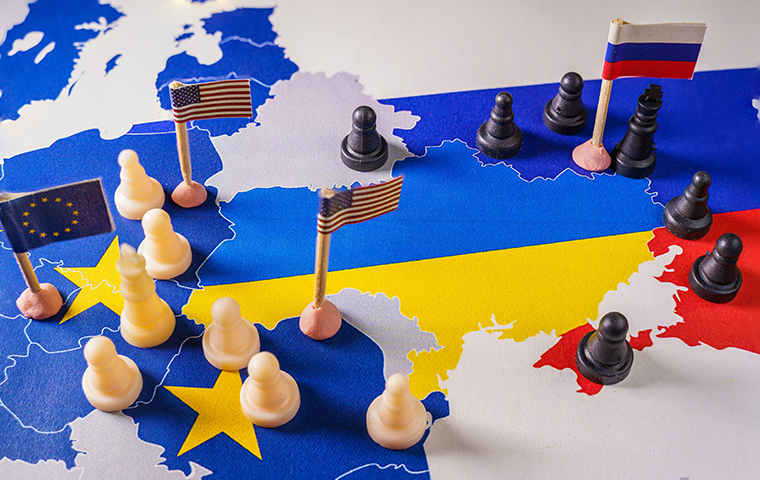Taiwan: Can It Keep Generating the Wave of Support?
Related Articles

The Netflix drama Wave Makers, released in late April, became a big hit in Taiwan. Featuring a fictional Taiwanese presidential election in 2022, the series depicts the efforts and setbacks of the campaign staffers along with gender-related issues such as same-sex relationships and gender inequality. A real presidential election is scheduled in January 2024 to elect President Tsai Ing-wen’s successor, and this has also helped to boost the popularity of the drama.
In early May, Tsai posted on Instagram, “Every Taiwanese is a ‘Wave Maker’ of Taiwan’s democracy,” and recommended watching the series. “Democracy in Taiwan” is the slogan the Tsai administration has used under unification pressure from China to win friends in the international community.
Following the announcement of the G7 Hiroshima Leaders’ Communiqué, which mentioned “the importance of peace and stability across the Taiwan Strait“ for the third year in a row, the Taiwanese Ministry of Foreign Affairs also released the following comment on May 20: “Taiwan will continue to cooperate with the G7 and other like-minded countries to……stand up to authoritarian threats.” In this year’s Leaders’ Communiqué, “the importance of peace and stability across the Taiwan Strait” was followed by the phrase, “indispensable to security and prosperity in the international community” for the first time. The Foreign Ministry also touched on this point, and appealed, “This underscores the fact that Taiwan’s security has become a global issue,” expressing their confidence that the G7 has solidified its support for Taiwan compared to previous responses.
The G7’s stance on the Taiwan situation has changed dramatically in the last few years. While the U.S.-China conflict and the Ukraine War are major factors, Taiwan’s persistent efforts to gain support are no less important.
Since Tsai took office in 2016, Taiwan has worked on Asia’s first legalization of same-sex marriage, boosting female members in the Legislative Yuan (parliament) and local assemblies, and disclosure of administrative information. Because it has no diplomatic relations with major countries, Taiwan has focused on diplomacy by lawmakers, which is less likely to provoke a backlash from Beijing. Tsai and Vice President Lai Ching-te met foreign politicians in Taiwan and continued to appeal the situation of the Taiwan Strait. In the semiconductor sector, dominated by Taiwan firms, the administration approved the global chip maker Taiwan Semiconductor Manufacturing Company (TSMC) to build new plants in Japan and the U.S., thereby committing to steady semiconductor supply for the world’s automakers.
The series of efforts have led to signs of improvement in Taiwan’s security vulnerabilities that had been a concern.
This year, on the backdrop of bipartisan support, the U.S. Biden administration passed the legislation for maximum $10 billion military aid to Taiwan over the next five years. Taiwan has already secured an agreement from the U.S. to purchase roughly the same list of weapons Ukraine requested from the West. The U.K., France, and Canada have dispatched warships to the Taiwan Strait, while Japan has begun building a defense system with an eye on a Taiwan contingency. According to an analysis by Associate Research Fellow Chieh Chung of the Taiwanese think tank, National Policy Foundation, deterrence against China is steadily increasing.
Actions for Countering Authoritarianism

Meanwhile, Taiwan has a deep resentment of its current state, feeling the world has left it in isolation. During the seven years of the Tsai administration, nine nations have severed diplomatic ties with the country, and it has no prospect of joining the World Health Organization (WHO) or the Comprehensive and Progressive Agreement for Trans-Pacific Partnership (CPTPP). Chao Chun-shan, political scientist affiliated with the largest opposition, Kuomintang (KMT), and an honorary professor at Tamkang University, says, “Many countries voice support for Taiwan, while considering the impact to their China relations. But what Taiwan demands is an institutional guarantee, such as the membership of a multilateral framework.” Many in Taiwanese society will agree to this view.
The G7 Hiroshima Leaders’ Communiqué stated to “support a free and open Indo-Pacific and oppose any unilateral attempts to change the status quo by force or coercion,” vowing to work also with those outside the G7 framework. In the drama Wave Makers, there is a scene where the protagonist, public relations personnel at an opposing party, shouts at a campaign meeting, “If we do nothing, we’ll just lose,” which is the underlying theme of the series. At the upcoming presidential election, cross-strait relations would be the major point at issue. Candidates of the ruling and opposition parties, who are working on their campaign pledges, and voters, now starting to consider where to cast their ballots, are keeping a close eye on developments in China and what concrete actions the G7 will take in the future.
This is a translation of the Japanese article published in vol. 79 (May/Jun. 2023) of the Gaiko (Diplomacy) magazine.
Koichiro Ishida is the Taipei Bureau Chief of Asahi Shimbun. Graduating from the Osaka University of Foreign Studies in 1997, he joined the Asahi Shimbun. He mainly covered police and judicial areas in the city department in Osaka and Tokyo, then studied at the Institute of International Studies, Tsinghua University in Beijing from 2007 to 2008. After serving as the Liberal Democratic Party reporter at the political department and the Shenyang Bureau Chief in China, he has been in the current position since September 2020. He is the author of Taiwan ga mezasu minshushugi kyoken chugoku he no tairitsujiku [The Democracy Taiwan Aims for; Countering the Chinese Power] and the co-author of Kurenaii no to [The Red Party].




